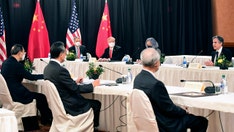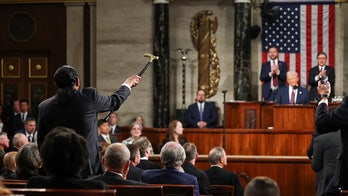US, China clash in first meeting under Biden
Retired General Jack Keane weighs in on the first summit between the U.S. and China under the Biden administration.
The White House said the Biden administration is ready to have a "frank conversation" with China and is negotiating from a position of "strength," as officials hold tense bilateral talks with Beijing.
White House principal deputy press secretary Karine Jean-Pierre on Friday from Air Force One described the meetings that Secretary of State Antony Blinken and national security adviser Jake Sullivan held Thursday with Chinese officials in Anchorage, Alaska.
A third meeting was scheduled for Friday morning.
"We knew going in to this it was going to be tough," Jean-Pierre said. "We are ready to have a frank conversation and we are going to continue those conversations."
Jean-Pierre doubled down, saying the White House "knew this would be a tough discussion, a frank discussion," but said that the administration is "still moving to diplomacy in every relationship."
Jean-Pierre added: "This is part of the process, we knew it was going to be intense.. we are going to continue moving forward."
Jean-Pierre said that having the meeting on U.S. soil was "the key" as to how they will move forward with China, saying it will be a "competitive relationship" but that they are going to "continue moving with diplomacy."
During Thursday’s meeting, Blinken said the Biden administration is united with its allies in pushing back against China’s increasing authoritarianism and assertiveness at home and abroad. Chinese Communist Party foreign affairs chief Yang Jiechi then unloaded a list of Chinese complaints about the U.S. and accused Washington of hypocrisy for criticizing Beijing on human rights and other issues.
"Each of these actions threaten the rules-based order that maintains global stability," Blinken said of China’s actions in Xinjiang, Hong Kong and Taiwan, and of cyberattacks on the United States and economic coercion against U.S. allies. "That’s why they’re not merely internal matters, and why we feel an obligation to raise these issues here today."
Sullivan amplified the criticism, saying China has undertaken an "assault on basic values."
"We do not seek conflict but we welcome stiff competition," he said.
Yang responded by demanding the U.S. stop pushing its own version of democracy at a time when the United States itself has been roiled by domestic discontent. He also accused the U.S. of failing to deal with its own human rights problems and took issue with what he said was "condescension" from Blinken, Sullivan and other U.S. officials.
"We believe that it is important for the United States to change its own image and to stop advancing its own democracy in the rest of the world," he said. "Many people within the United States actually have little confidence in the democracy of the United States."
CHINA SLAMS US ON HUMAN RIGHTS, LEAVES OUT ABUSES AGAINST UYGHURS, TIBETANS, HONG KONG
"China will not accept unwarranted accusations from the U.S. side," he said, adding that recent developments had plunged relations "into a period of unprecedented difficulty" that "has damaged the interests of our two peoples."
"There is no way to strangle China," he said.
Underscoring the animosity, the State Department blasted the Chinese delegation for violating an agreed upon two-minute time limit for opening statements and suggested it "seem(ed) to have arrived intent on grandstanding, focused on public theatrics and dramatics over substance."
"America’s approach will be undergirded by confidence in our dealing with Beijing — which we are doing from a position of strength — even as we have the humility to know that we are a country eternally striving to become a more perfect union," it said.
A Biden official called a second meeting Thursday evening "substantive, serious, and direct," saying both sides were able to outline their interests and priorities, Reuters reported.
CLICK HERE TO GET THE FOX NEWS APP
U.S.-China ties have been torn for years, and the Biden administration has yet to signal whether it’s ready or willing to back away from the hard-line stances taken under Donald Trump.
Just a day before the meeting, Blinken announced new sanctions over Beijing’s crackdown on pro-democracy advocates in Hong Kong. In response, China stepped up its rhetoric opposing U.S. interference in domestic affairs and complained directly about it.
Trump had taken pride in forging what he saw as a strong relationship with Chinese leader Xi Jinping. But the relationship disintegrated after the coronavirus pandemic spread from the Wuhan province across the globe and unleashed a public health and economic disaster.
The Associated Press contributed to this report.
















































